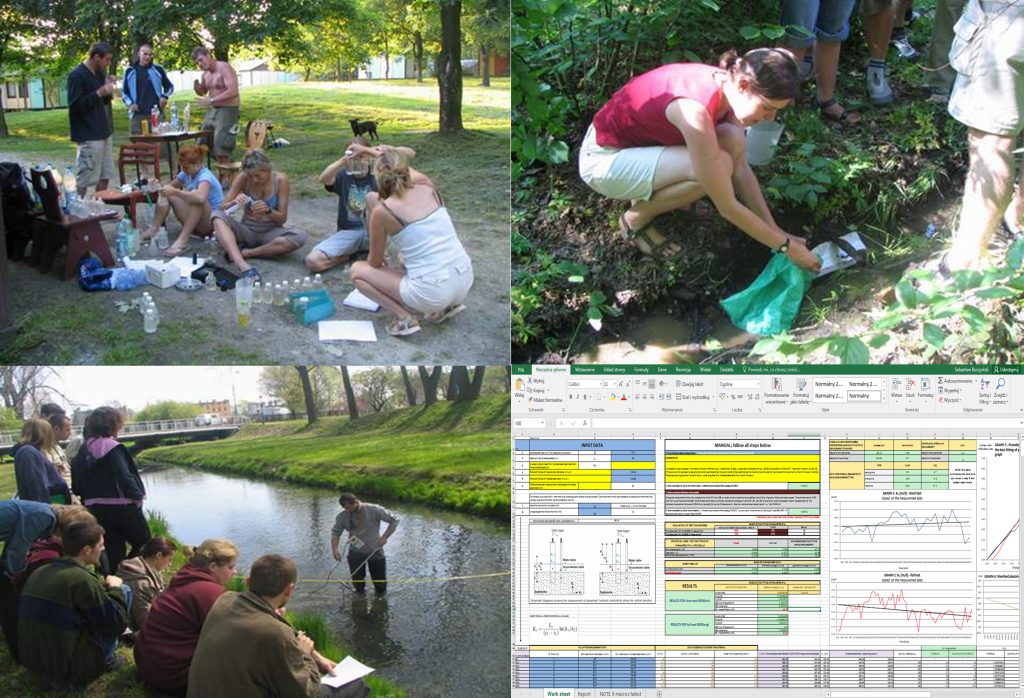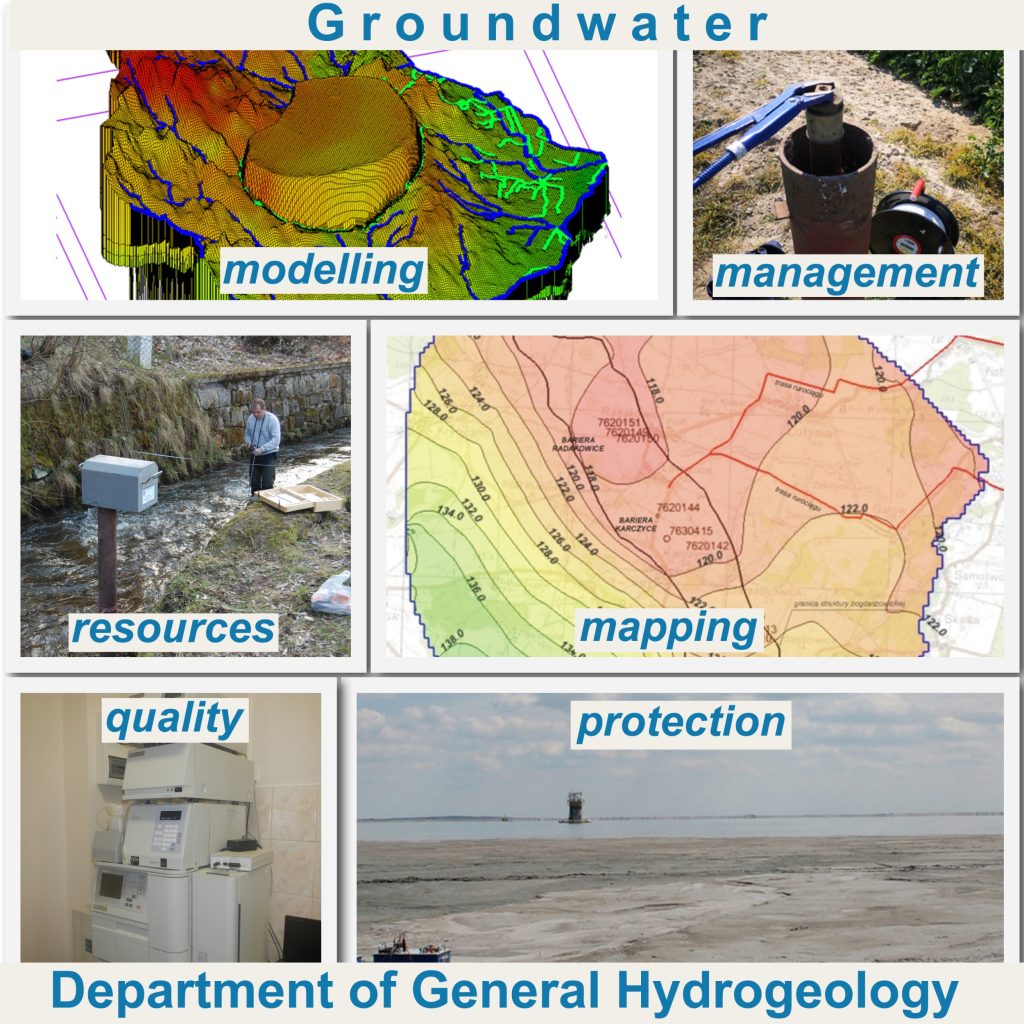
Department of Basic Hydrogeology
The Department of Basic Hydrogeology teaches and conducts scientific and implementation research in the broadly understood fields of hydrogeology, hydrology, and environmental protection. The department’s sub-units, the Laboratory for Hydrogeological Parameters of Rocks and the Environmental Geology Laboratory, are equipped with specialized equipment (HPLC liquid chromatography, Numis Lite magnetic resonance) and software (GMS, Visual MODFLOW) that enable comprehensive research and problem-solving. In addition, we have the necessary equipment for determining the filtration parameters of rocks and soils, water samplers and pumps, and multiparameter probes capable of conducting surveys of surface and underground waters down to 100 meters. The department is led by Dr. hab. Sebastian Buczyński and consists of six scientific employees, one Ph.D. student, and a technical staff member (laboratory assistant):
- Prof. Dr. hab. Stanislaw Staśko (professor),
- Dr. hab. Sebastian Buczyński (assistant professor),
- Dr. hab. Robert Tarka (assistant professor),
- Dr. Magdalena Modelska (assistant professor),
- Dr. Tomasz Olichwer (assistant professor),
- Dr. Marek Wcisło (assistant professor),
- Marta Błachowicz (Trałka), MA (Ph.D. student),
- Adam Wojtyna, MA (technician)
Our team has experience in documenting water resources, modeling flow and migration of contaminants in groundwater, quantitative and qualitative monitoring of surface and groundwater. The detailed issues and research directions carried out in the Department include:
- development of conceptual and numerical models of aquifer systems and structures,
- analysis of water inflow to mine workings using numerical modeling
- development of concepts for dewatering mining facilities,
- designing and implementing a network of quantitative and qualitative monitoring of groundwater,
- assessing the vulnerability of groundwater to pollution,
- sampling of water and soil along with their quality assessment,
- analysis of flooding and draining (including well drying),
- determining the extent of the impact of mine dewatering,
- determine the impact of the investment on groundwater,
- balancing and documenting water resources of regional hydrogeological structures and water intakes,
- developing water economy balances,
- well designs,as-built documentation, and hydrogeological supervision; coordination of project phases: design – execution – operation of the investment,
- verification of design solutions,
- supervision over the implementation and operation of investments concerning operational issues related to it,
- designation of protective zones of water intakes,
- hydrological, hydrogeological, and sozological mapping,
- assessments and forecasts of changes in hydrographic conditions,
- establishing rules for the protection of aquifer systems; assessing the impact of waste disposal on the water and groundwater environment and minimizing it,
- water supply concepts (identification of promising areas for the construction of new intakes),
- systemic solutions to unusual hydrogeological problems using modern research methods
- didactic activities (nature trails, workshops and geoenvironmental and environmental classes for schools).
The Department’s employees are implementing the following research projects:
| NCBiR CuBR No. CuBr-4/04/2019 | Innowacyjne technologie ograniczenia migracji zasolonych podziemnych do wód powierzchniowych w rejonie OUOW Żelazny Most [Innovative technologies to limit the migration of saline groundwater to surface waters in the Żelazny Most OUOW area] | Head: Prof. Dr. hab. Stanislaw Staśko |
| Grant from the Excellence Initiative – Research University program | Hydrogeochemia i geneza solanek w wysadzie solnym Kłodawa [Hydrogeochemistry and origin of brines in the Kłodawa salt diapir] | Head: Dr. hab. Sebastian Buczyński, |
| EEA (Norwegian and EEA Funds) – Environment, Energy and Climate Change Program | Karpaty Łączą – ochrona Torfowisk Orawa-Nowy Targ [United through the Carpathians – Protection of the Orawa-Nowotar Peatlands] | Head: Dr. hab. Sebastian Buczyński, |
| City of Wrocław No. 3871/U/2022/A | Możliwości infiltracyjnego zagospodarowania wód opadowych we Wrocławiu [Possibilities for the infiltration management of rainwater in Wrocław] | Head: Dr. hab. Sebastian Buczyński, |
| Project under Interreg V-A Czech Republic – Poland | GECON GAME – w poszukiwaniu skarbów geoparków [GECON GAME – in search of geopark treasures] | Head: Dr. hab. Robert Tarka, |
Selected courses taught by the Department’s staff in geological directions at the Institute:
- Exploration and documentation of deposits
- Hydrology,
- Hydrogeology,
- Changes in the aquatic environment under the influence of human activities,
- Design, construction and exploitation of groundwater intakes,
- Environmental pollution analysis,
- Drainage of construction sites and structures,
- Groundwater quality and protection,
- Geochemical research methods,
- Numerical modeling,
- Statistics in the life sciences,
- Hydrogeology and hydrodynamics of oil and gas fields,
- Environmental monitoring,
- Information technology in geological engineering,
- Contemporary research methods in hydrogeology,
- Water and soil quality testing methods,
- Water management and water resources management,
- Legal basics in geological activity,
- CAD design basics,
- Entrepreneurship and managing a small business,
- Groundwater quality,
- Groundwater exploitation,
- Hydrogeological mapping,


The expert activities of the staff of the Department of Basic Hydrogeology include the following activities performed for the institutions listed below:
- Chairman of the Board, Polish National Committee, International Association of Hydrogeologists (IAH) – Prof. Dr. hab. Stanisław Staśko
